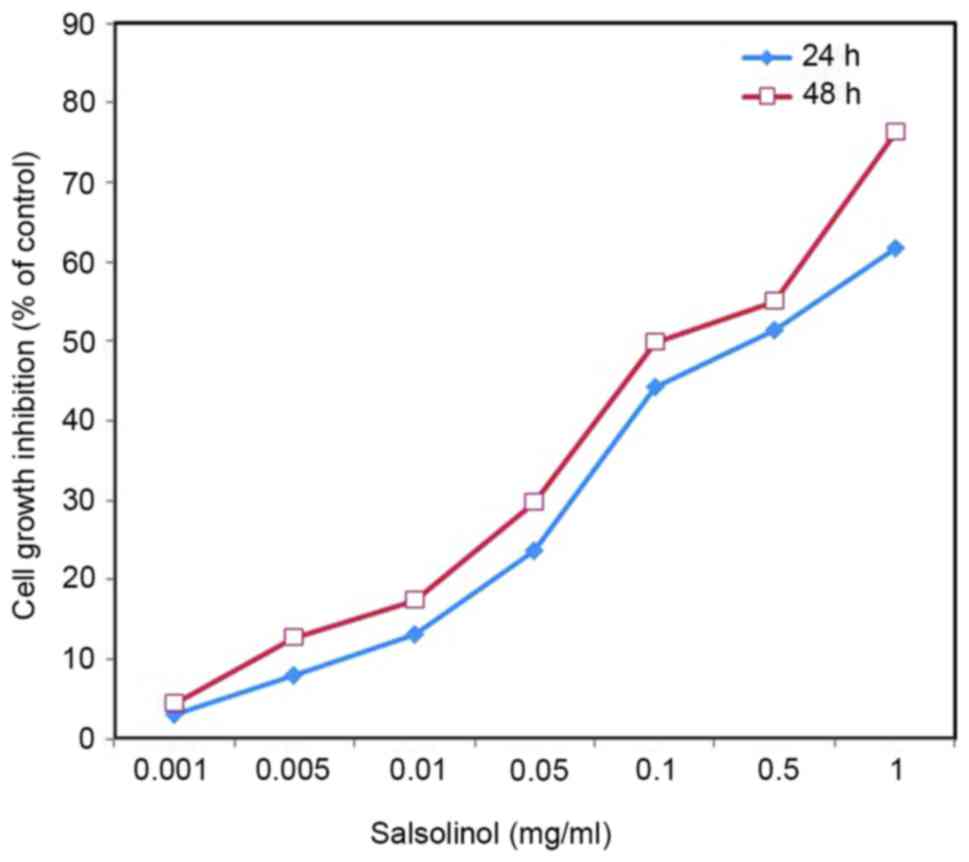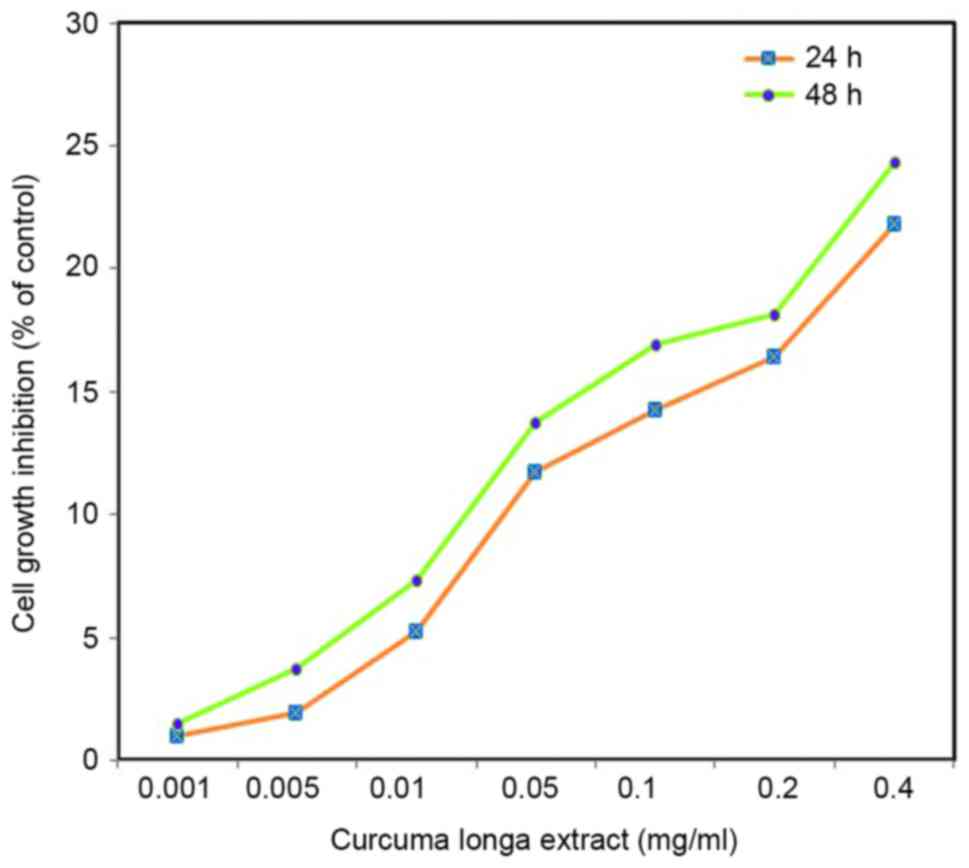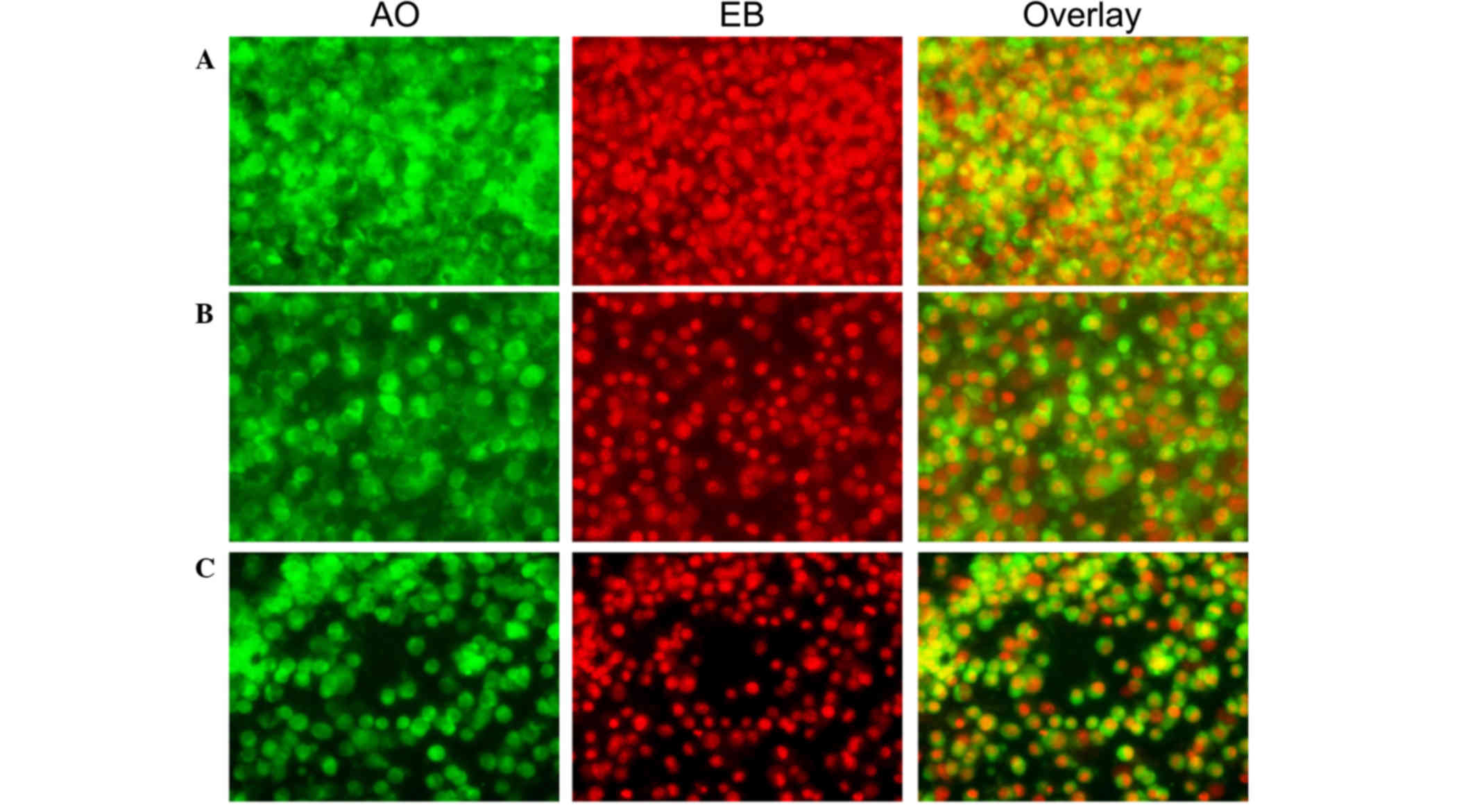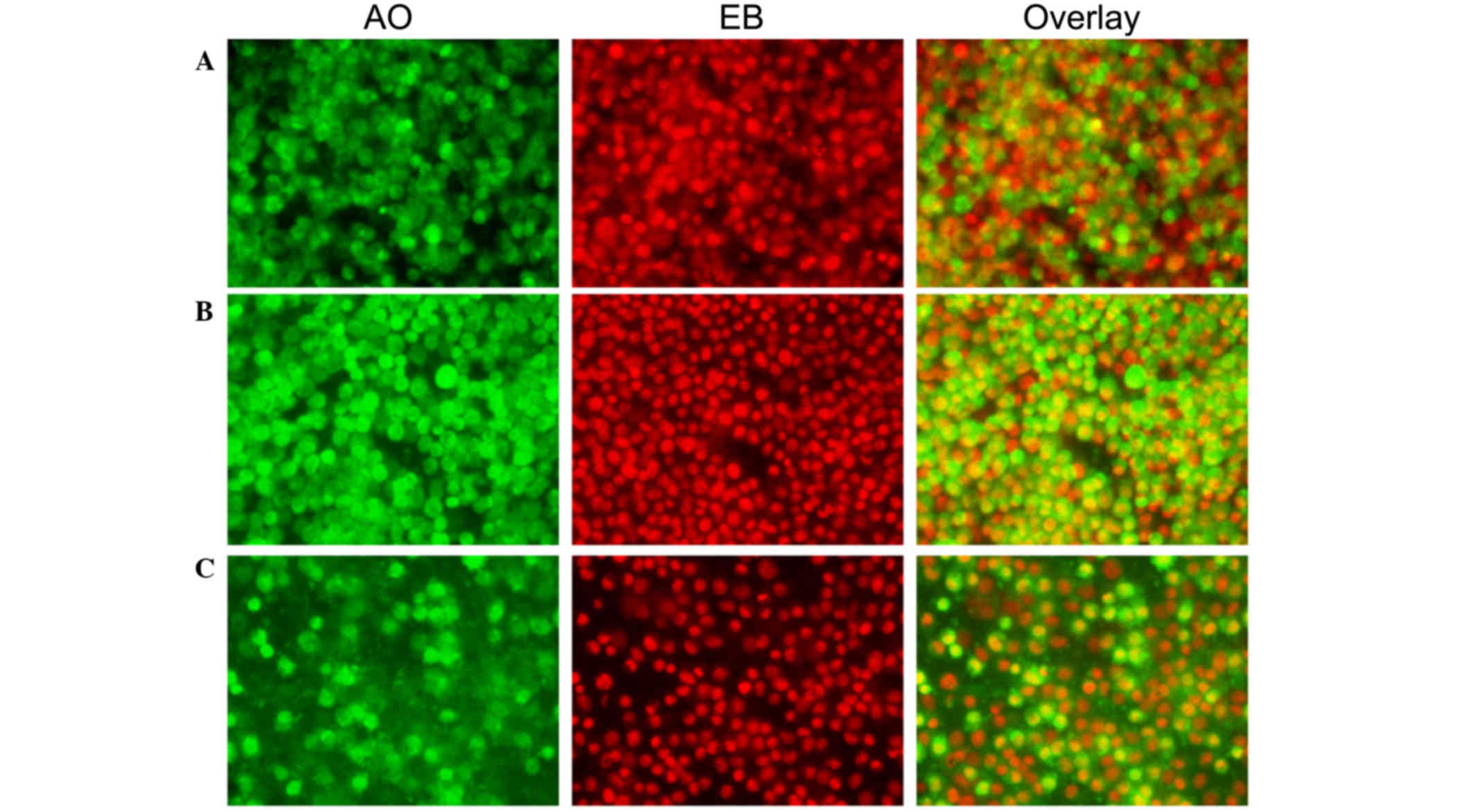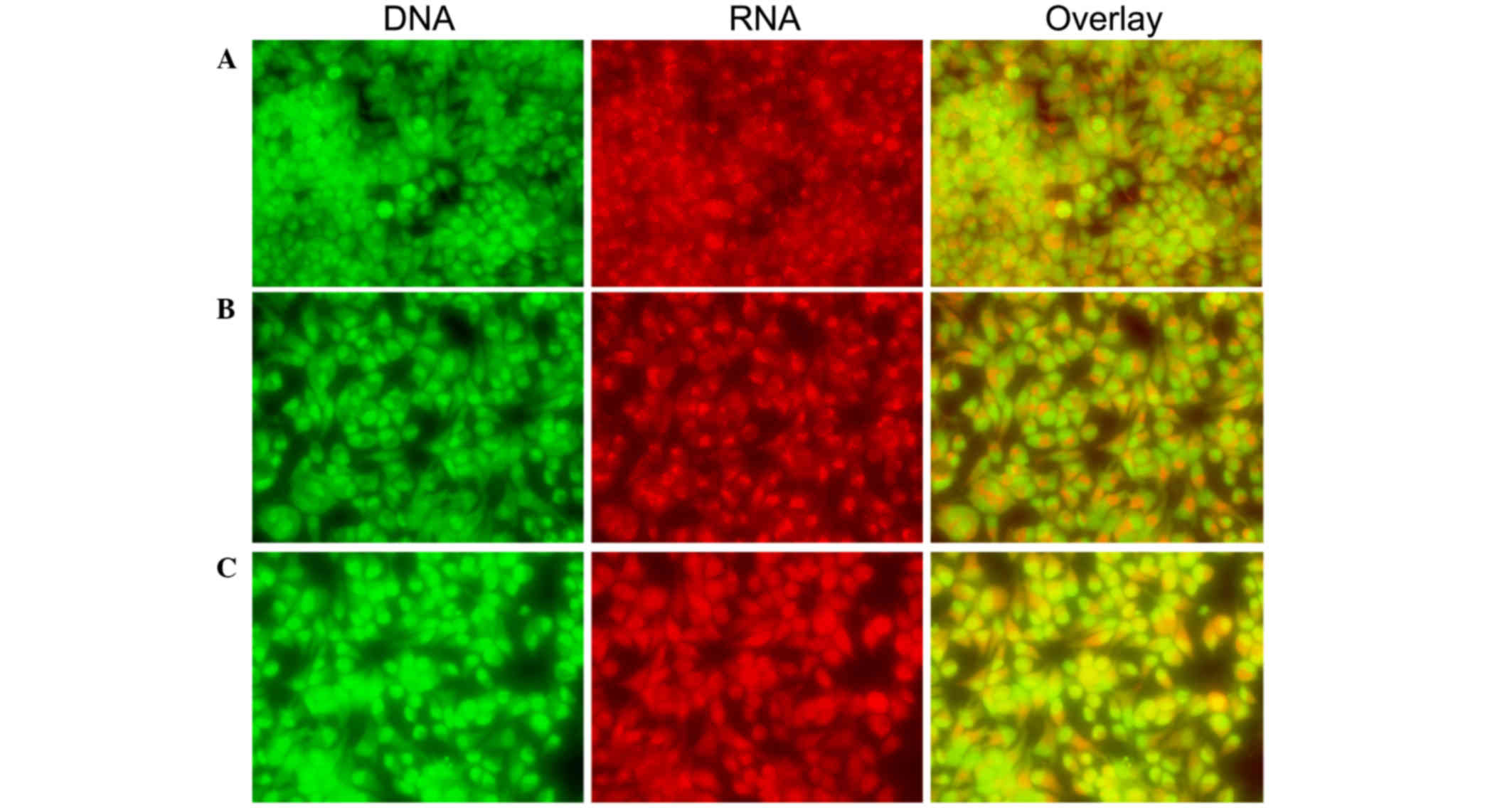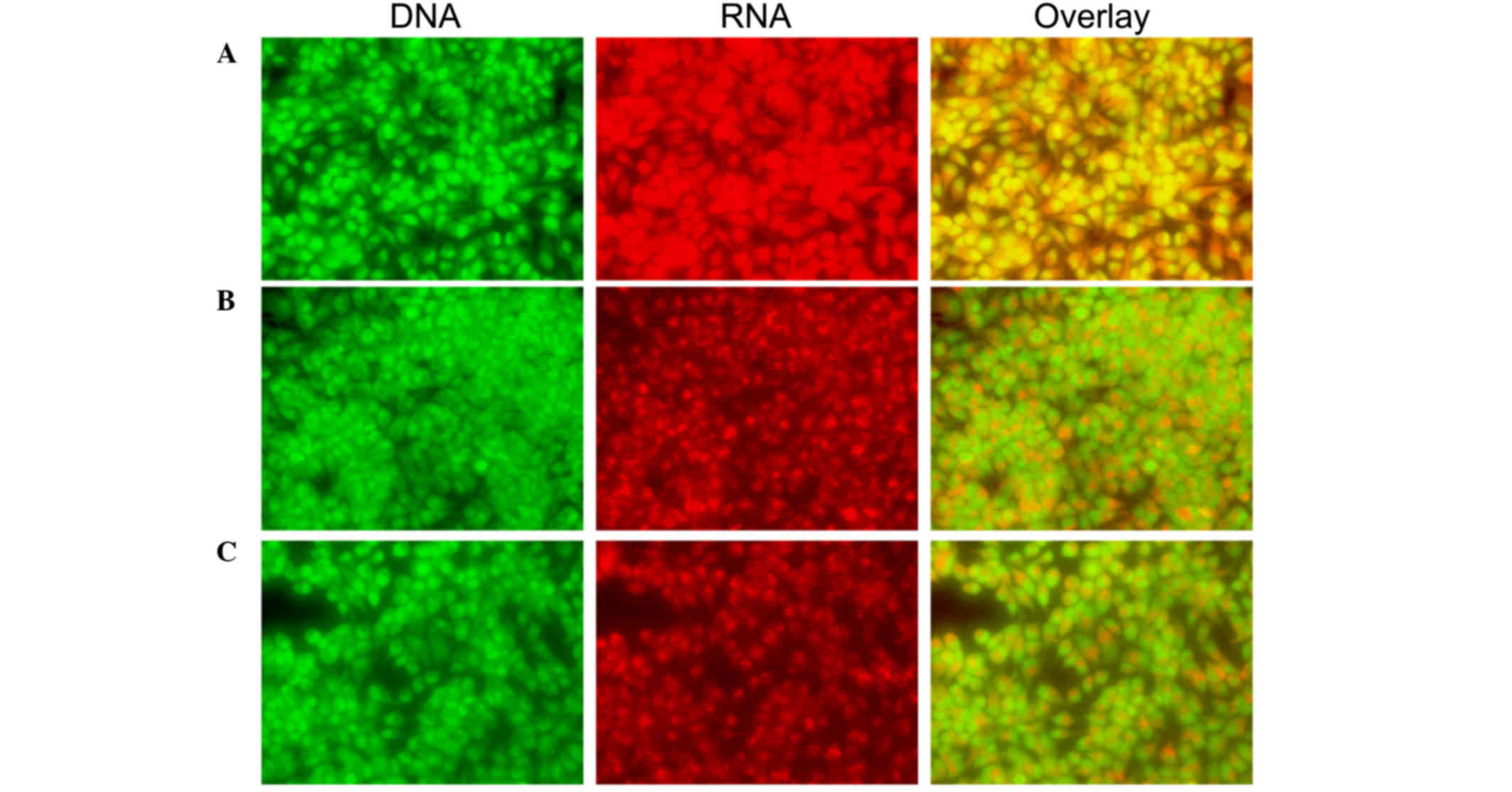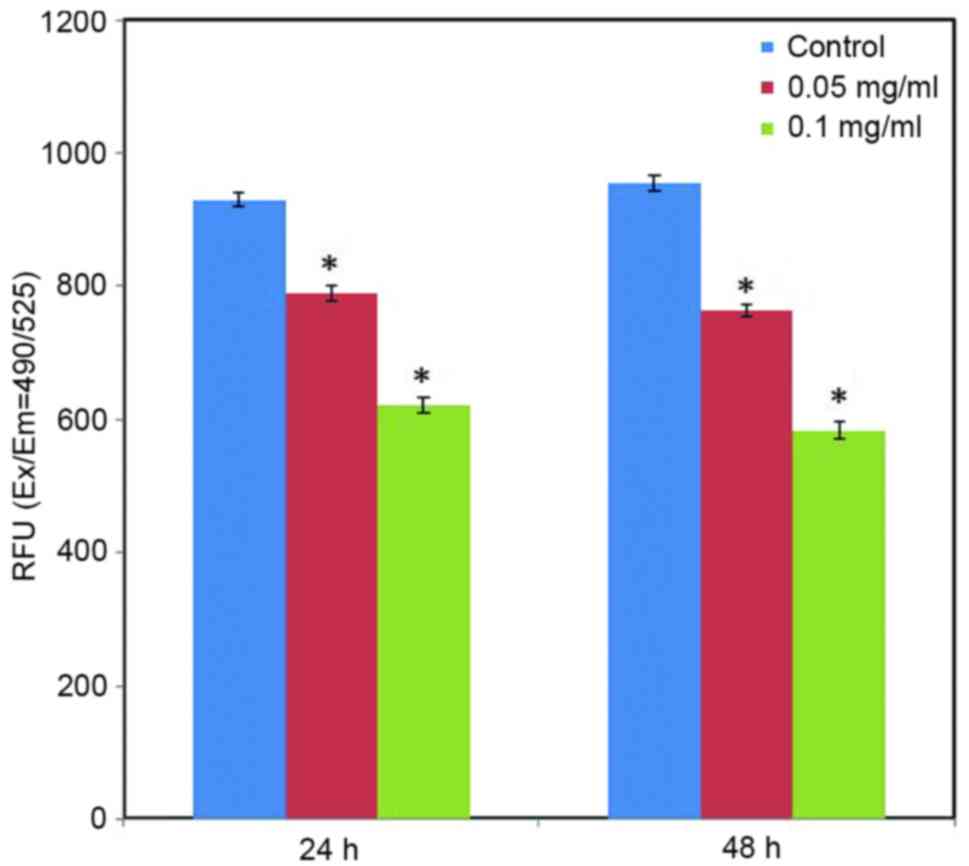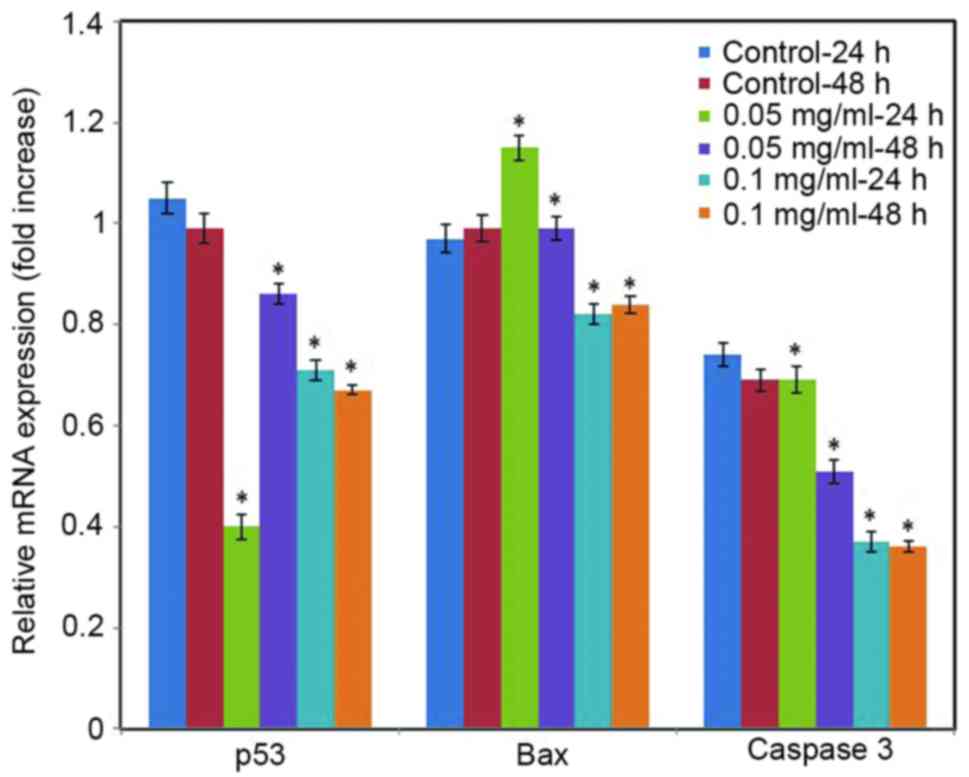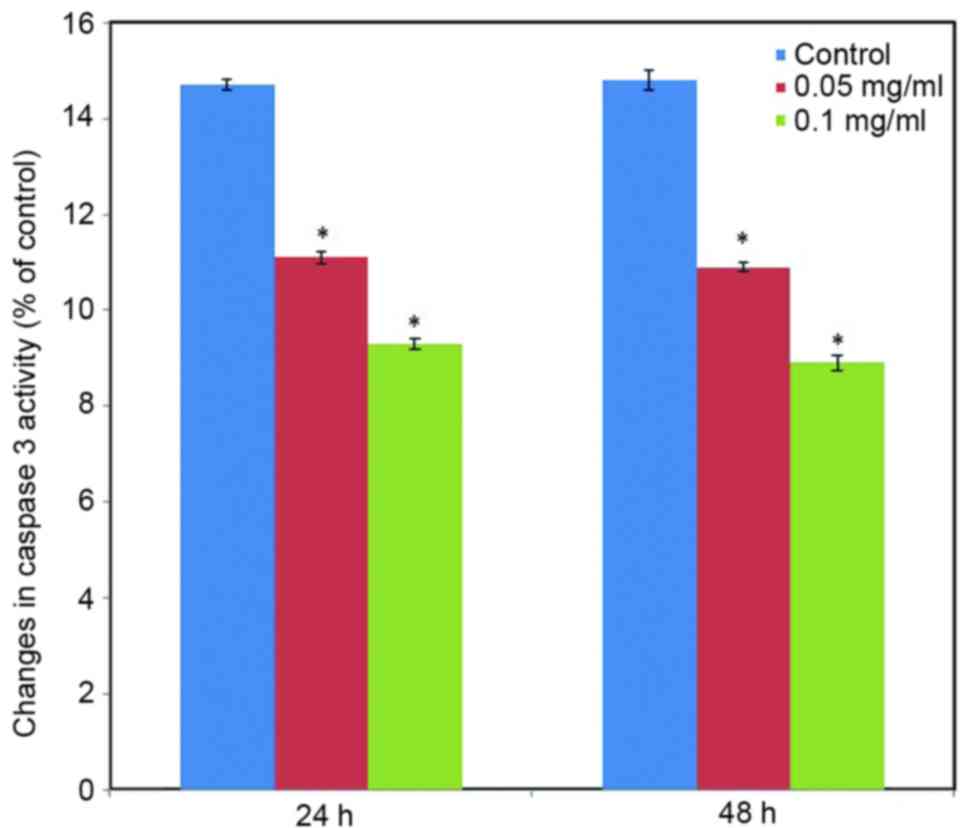|
1
|
Chattopadhyay I, Biswas K, Bandyopadhyay U
and Banerjee RK: Turmeric and curcumin: Biological actions and
medicinal applications. Curr Sci. 87:44–53. 2004.
|
|
2
|
Khalsa SVK: Turmeric. The Golden Healer.
http://www.healthy.net/recipe/health/turmeric_the_golden_healer/47Accessed.
2013.
|
|
3
|
Chaturvedi TP: Uses of turmeric in
dentistry: An update. Indian J Dent Res. 20:107–109. 2009.
View Article : Google Scholar : PubMed/NCBI
|
|
4
|
Tayyem RF, Heath DD, Al-Delaimy WK and
Rock CL: Curcumin content of turmeric and curry powders. Nutr
Cancer. 55:126–131. 2006. View Article : Google Scholar : PubMed/NCBI
|
|
5
|
Aggarwal BB and Harikumar KB: Potential
therapeutic effects of curcumin, the anti-inflammatory agent,
against neurodegenerative, cardiovascular, pulmonary, metabolic,
autoimmune and neoplastic diseases. Int J Biochem Cell Biol.
41:40–59. 2009. View Article : Google Scholar : PubMed/NCBI
|
|
6
|
Jurenka JS: Anti-inflammatory properties
of curcumin, a major constituent of Curcuma longa: A review
of preclinical and clinical research. Altern Med Rev. 14:141–153.
2009.PubMed/NCBI
|
|
7
|
Sandur SK, Ichikawa H, Pandey MK,
Kunnumakkara AB, Sung B, Sethi G and Aggarwal BB: Role of
pro-oxidants and antioxidants in the anti-inflammatory and
apoptotic effects of curcumin (diferuloylmethane). Free Radic Biol
Med. 43:568–580. 2007. View Article : Google Scholar : PubMed/NCBI
|
|
8
|
Kulkarni SK, Bhutani MK and Bishnoi M:
Antidepressant activity of curcumin: Involvement of serotonin and
dopamine system. Psychopharmacology (Berl). 201:435–442. 2008.
View Article : Google Scholar : PubMed/NCBI
|
|
9
|
Bhutani MK, Bishnoi M and Kulkarni SK:
Anti-depressant like effect of curcumin and its combination with
piperine in unpredictable chronic stress-induced behavioral,
biochemical and neurochemical changes. Pharmacol Biochem Behav.
92:39–43. 2009. View Article : Google Scholar : PubMed/NCBI
|
|
10
|
Li YC, Wang FM, Pan Y, Qiang LQ, Cheng G,
Zhang WY and Kong LD: Antidepressant-like effects of curcumin on
serotonergic receptor-coupled AC-cAMP pathway in chronic
unpredictable mild stress of rats. Prog Neuropsychopharmacol Biol
Psychiatry. 33:435–449. 2009. View Article : Google Scholar : PubMed/NCBI
|
|
11
|
Hurley LL, Akinfiresoye L, Nwulia E,
Kamiya A, Kulkarni AA and Tizabi Y: Antidepressant-like effects of
curcumin in WKY rat model of depression is associated with an
increase in hippocampal BDNF. Behav Brain Res. 239:27–30. 2013.
View Article : Google Scholar : PubMed/NCBI
|
|
12
|
Ng TP, Chiam PC, Lee T, Chua HC, Lim L and
Kua EH: Curry consumption and cognitive function in the elderly. Am
J Epidemiol. 164:898–906. 2006. View Article : Google Scholar : PubMed/NCBI
|
|
13
|
Aggarwal BB, Sundaram C, Malani N and
Ichikawa H: Curcumin: The Indian solid gold. Adv Exp Med Biol.
595:1–75. 2007. View Article : Google Scholar : PubMed/NCBI
|
|
14
|
Tieu K: A guide to neurotoxic animal
models of Parkinson's disease. Cold Spring Harb Perspect Medicine.
1:a0093162011. View Article : Google Scholar
|
|
15
|
Mravec B: Salsolinol, a derivate of
dopamine, is a possible modulator of catecholaminergic
transmission: A review of recent developments. Physiol Res.
55:353–364. 2006.PubMed/NCBI
|
|
16
|
Antkiewicz-Michaluk L: Endogenous risk
factors in Parkinson's disease: Dopamine and
tetrahydroisoquinolines. Pol J Pharmacol. 54:567–572.
2002.PubMed/NCBI
|
|
17
|
Maruyama W, Dostert P, Matsubara K and
Naoi M: N-methyl(R)salsolinol produces hydroxyl radicals:
Involvement to neurotoxicity. Free Radic Biol Med. 19:67–75. 1995.
View Article : Google Scholar : PubMed/NCBI
|
|
18
|
Moser A, Siebecker F, Vieregge P,
Jaskowski P and Kömpf D: Salsolinol, catecholamine metabolites, and
visual hallucinations in L-dopa treated patients with Parkinson's
disease. J Neural Transm Vienna. 103:421–432. 1996. View Article : Google Scholar : PubMed/NCBI
|
|
19
|
Alladi PA, Mahadevan A, Yasha TC, Raju TR,
Shankar SK and Muthane U: Absence of age-related changes in nigral
dopaminergic neurons of Asian Indians: Relevance to lower incidence
of Parkinson's disease. Neuroscience. 159:236–245. 2009. View Article : Google Scholar : PubMed/NCBI
|
|
20
|
Darvesh AS, Carroll RT, Bishayee A,
Novotny NA, Geldenhuys WJ and Van der Schyf CJ: Curcumin and
neurodegenerative diseases: A perspective. Expert Opin Investig
Drugs. 21:1123–1140. 2012. View Article : Google Scholar : PubMed/NCBI
|
|
21
|
Ramlochansingh C, Taylor RE and Tizabi Y:
Toxic effects of low alcohol and nicotine combinations in SH-SY5Y
cells are apoptotically mediated. Neurotox Res. 20:263–269. 2011.
View Article : Google Scholar : PubMed/NCBI
|
|
22
|
Brown D, Tamas A, Reglödi D and Tizabi Y:
PACAP protects against salsolinol-induced toxicity in dopaminergic
SH-SY5Y cells: Implication for Parkinson's disease. J Mol Neurosci.
50:600–607. 2013. View Article : Google Scholar : PubMed/NCBI
|
|
23
|
Muthuraman P, Gansukh E, Bhupendra M,
Murugesan C, Rafi N and Kim DH: Investigation of the role of
aspartame on apoptosis process in Hela cells. Saudi J Biol Sci.
June 15–2015.(Epub ahead of print).
doi:10.1016/j.sjbs.2015.06.001.
|
|
24
|
Muthuraman P, Gansukh E, Baskar V,
Bhupendra M, Rafi N, Bong YJ and Kim DH: Time and
concentration-dependent therapeutic potential of silver
nanoparticles in cervical carcinoma cells. Biol Trace Elem Res.
170:309–319. 2016. View Article : Google Scholar : PubMed/NCBI
|
|
25
|
Kirkland RA, Windelborn JA, Kasprzak JM
and Franklin JL: A Bax-induced pro-oxidant state is critical for
cytochrome c release during programmed neuronal death. J Neurosci.
22:6480–6490. 2002.PubMed/NCBI
|
|
26
|
Pandurangan M, Veerappan M and Kim DH:
Cytotoxicity of zinc oxide nanoparticles on antioxidant enzyme
activities and mRNA expression in the cocultured C2C12 and 3T3-L1
cells. Appl Biochem Biotechnol. 175:1270–1280. 2015. View Article : Google Scholar : PubMed/NCBI
|
|
27
|
Pfaffl MW: A new mathematical model for
relative quantification in real-time RT-PCR. Nucleic Acids Res.
29:e452001. View Article : Google Scholar : PubMed/NCBI
|
|
28
|
Muthuraman P: Effect of cortisol on
caspases in the co-cultured C2C12 and 3 T3-L1 cells. Appl Biochem
Biotechnol. 173:980–988. 2014. View Article : Google Scholar : PubMed/NCBI
|
|
29
|
Frankfurt OS and Krishan A:
Apoptosis-based drug screening and detection of selective toxicity
to cancer cells. Anticancer Drugs. 14:555–561. 2003. View Article : Google Scholar : PubMed/NCBI
|
|
30
|
Das JR and Tizabi Y: Additive protective
effects of donepezil and nicotine against salsolinol-induced
cytotoxicity in SH-SY5Y cells. Neurotox Res. 16:194–204. 2009.
View Article : Google Scholar : PubMed/NCBI
|
|
31
|
Song JX, Shaw PC, Wong NS, Sze CW, Yao XS,
Tang CW, Tong Y and Zhang YB: Chrysotoxine, a novel bibenzyl
compound selectively antagonizes MPP+, but not rotenone,
neurotoxicity in dopaminergic SH-SY5Y cells. Neurosci Lett.
521:76–81. 2012. View Article : Google Scholar : PubMed/NCBI
|
|
32
|
Storch A, Kaftan A, Burkhardt K and
Schwarz J: 1-Methyl-6,7-dihydroxy-1,2,3,4-tetrahydroisoquinoline
(salsolinol) is toxic to dopaminergic neuroblastoma SH-SY5Y cells
via impairment of cellular energy metabolism. Brain Res. 855:67–75.
2000. View Article : Google Scholar : PubMed/NCBI
|
|
33
|
Zhang Y, Wang L, Mu X, Duan J, Zhu Y, Qing
H, Li Y, Xiao S and Deng Y: Assessment of salsolinol N
methyltransferase activity in rat peripheral lymphocytes by liquid
chromatography-electrospray time-of-flight mass spectrometry. Anal
Bioanal Chem. 399:3541–3545. 2011. View Article : Google Scholar : PubMed/NCBI
|
|
34
|
Copeland RL Jr, Das JR, Kanaan YM, Taylor
RE and Tizabi Y: Antiapoptotic effects of nicotine in its
protection against salsolinol-induced cytotoxicity. Neurotox Res.
12:61–69. 2007. View Article : Google Scholar : PubMed/NCBI
|
|
35
|
Worth PF: How to treat Parkinson's disease
in 2013. Clin Med. 13:93–96. 2013. View Article : Google Scholar
|















